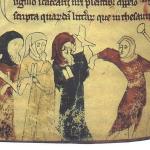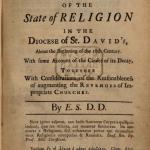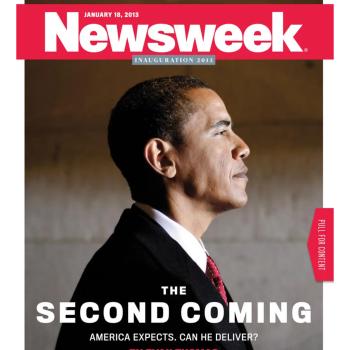Do not be overcome by evil, but overcome evil with good. – Romans 12:21
It is bad enough to be flooded with images of a violent world in which you have little control. We’re currently in such a moment, surrounded by images of brutal war. But atrocity also has a deeper effect on us mentally and spiritually: it stunts our moral imagination.
I do not claim to be a foreign relations expert, but one thing that I am pretty confident in is the fact that the logic of revenge and retaliation is an insatiable beast, which is one of the reasons that Jesus taught us to starve it by consistently and constantly loving our enemies. But it is a logic that we often fall into, especially if we have been the victims of atrocities. This is precisely the danger though: the weight and heinousness of a particular crime is often used to justify a heinous response.
This is not merely true today; it has often, perhaps always, been true of us. I want to offer an example from my lynching research: the testimony of Atticus Greene Haygood, past president of Emory College (now Emory University), and bishop of the Methodist Episcopal Church South in the late 19th century.
In 1893, Paris, Texas saw one of the most brutal lynchings ever perpetrated on United States soil. The shock of both the crime and the punishment sent the country reeling. For the crime, Henry Smith was accused of kidnapping, raping, choking and mangling the body of 4-year-old Myrtle Vance. Consider the alleged atrocity. As punishment, a mob, numbered at 10,000 by one account, tortured him for about an hour with red hot iron brands, burning his feet, legs, stomach, back and arms before burning his eyes out and thrusting those irons down his throat. Then the crowd doused Smith in oil before burning him alive. In the magazine, The Forum, a few individuals responded to this particular horror. Atticus Haygood was one such individual.
Haygood had a reputation for a paternalistic attitude toward Black people. Considered barely, that was better than the role of a hostile white supremacist but the assumed supremacy was still present. Compared to the radical racists who called him a race traitor because of his theory that Black people could be civilized and that they ought to be treated as siblings, Haygood’s racial reasoning could be characterized as comparatively progressive. To characterize his thinking in that way, however, is to state something technically true but practically unhelpful. This becomes clear when his thought, considered abstractly in his book, Our Brother In Black, took concrete form when responding to atrocity.
In his Forum article, which you can read here, Haygood was explicitly called on not to explain the killing of Smith but his burning. Already there is an indication of moral imagination in that framing: it’s completely understandable that Smith was killed, but did the crowd have to burn him? The torture was the atrocity, not the death. Haygood’s most trenchant critique of lynching in this editorial was not that it was unjust, but that it was anarchic. Lynching was evil to Haygood because “in organized society, there is no higher civil or social duty than obedience to law; the lyncher is, of all men, the violator of law.” Haygood then continued to read that indictment even into the minds of the offenders, claiming that lynchers “are conscious of their own lawlessness, and seek protection in masks or numbers.” To the contrary, historian Amy Wood and others have followed many anti-lynching activists in arguing that numbers were not in fact some way to hide from persecution. The lyncher knew that they would not be held accountable for their actions. Lynching was rather a celebrated spectacle, photos of which circulated within communities. Contra Haygood, the lyncher did not hide in numbers. Their social power was amplified by those numbers.
But Haygood’s most profound failure was the vitiation of his moral imagination, exemplified by this paragraph:
Sane men who are just will consider the provocation. Sane men who are righteous will remember not only the brutish man who dies by the slow torture of fire; they will think also of the ruined woman, worse tortured than he. When they think of the infuriated mob in Paris, Texas, and the negro ruffian tortured most horribly till he was dead, they will think also of a white baby, four years old, first outraged with demoniacal cruelty and then taken by her heels and torn asunder in the mad wantonness of gorilla ferocity. Indeed, the instant comment of a negro man to whom I stated this case was, “He ought to have been burnt.” Men, no matter where they live or how high their personal or social development, with human hearts in them, will ask, “What if she had been my baby?”
There are at least four major issues with this paragraph: the account of comparative suffering, the dehumanizing language describing the lynching victim, the instrumentalization of a black man, and the assumption of universal sympathy. First, Haygood, in believing the sensationalized news that he was fed by the white press, considered it important enough to write that rape is worse than being burned alive. This is not produced as a moral indictment; rather, it is marshaled as a justification for the burning. The context is that the crime is so horrible that such a punishment makes sense. Only Haygood’s critics would recognize that the very argument that burning a human being makes sense is, in its own way, murderous.
Secondly, quoting Myrtle Vance’s father in describing Henry Smith’s alleged crimes as “demonic” and indicative of “gorilla ferocity” was not an act of racist dog-whistling; it was outright racial provocation. The framing of Smith as an inhuman aggressor was a mob tactic to soften the moral travesty of lynching and Haygood, by repeating it, trumpeted his complicity in such an act. It was for these statements that Ida B. Wells referred to this article as Haygood’s “remarkable apology for lynching.” She would go on to characterize such statements as deliberate and malicious, having much reason to characterize them as such.
Third, in order to buttress what amounted to his abhorrent moral position, he referred to a Black man he spoke to who agreed, “He ought to have been burnt.” In case anyone is wondering, abhorrent moral positions can be held by anyone, regardless of racialization. Yet, rhetorically, it was important for Haygood to make the claim, “Look! Even Black people agree with me!”
Fourth and lastly, Haygood, while he tried to avoid saying it explicitly, sympathized with the mob and, by his writing, invited the reader to do the same. In asking us to consider “What if she had been my baby?”, there is an assumed answer. He even offers that answer later: if someone had done that to his child, he would have been in the mob too. For him, the reason for this lynching was a moment of temporary insanity, the likes of which would take hold of any human being in the face of such circumstances. The provocation provided rationale for the barbarity.
These four grievous errors all bear witness to the ingredients necessary to justify atrocity. Focus on the atrocity itself without care for the conditions that brought that atrocity about and compassion for all those who suffer can very easily snowball into its own atrocities. As unsatisfying as this may be, the operative question for us is not whether or not the guilty are guilty. Henry Smith may have done what he was accused of. He may not have. Historians go back and forth as they do with many spectacle lynchings. The question that imposes itself on us is this: are we going to be the kind of people who visit the same brutality upon those who brutalize?
The Christian does not have that option. As people who believe that the Son of God took on flesh, we also have a particular understanding of what that means: specifically the words of the author of the book of Hebrews: that Christ shared in our humanity “so that by his death he might break the power of him who holds the power of death—that is, the devil—and free those who all their lives were held in slavery by their fear of death.” (Hebrews 2:14–15) Lynching specifically, but violence in general, dictates action through fear. Lynching ought to first and foremost be understood as a regime of domestic terror, whose purpose was to maintain a system of economic domination. War throughout human history has had similar aims: to maintain and protect power, land, and resources. Brutality, like all evil, seeks to overcome us. But we ought to take the words of the Apostle Paul very, very seriously: to never be overcome by evil, but rather to overcome evil, neither with revenge nor justification, but with good.













